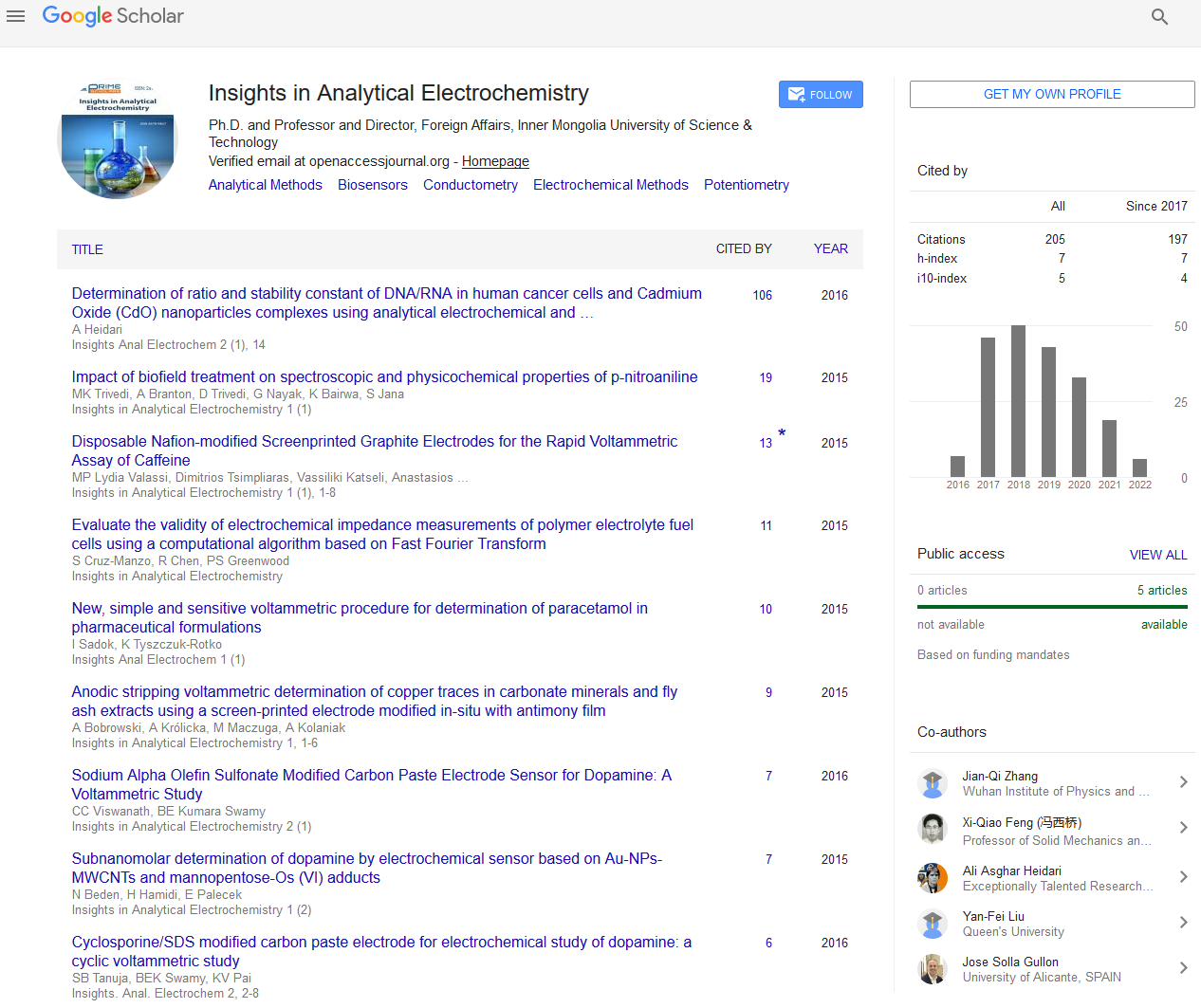Commentary - (2023) Volume 9, Issue 3
Unraveling Mysteries: The Marvels of Analytical Electrochemical Methods
Valerie Chew*
Department of Materials, Guangzhou Institute of Advanced Technology, China
*Correspondence:
Valerie Chew,
Department of Materials, Guangzhou Institute of Advanced Technology,
China,
Email:
Received: 30-Aug-2023, Manuscript No. ipaei-23-18174;
Editor assigned: 01-Sep-2023, Pre QC No. ipaei-23-18174 (PQ);
Reviewed: 15-Sep-2023, QC No. ipaei-23-18174;
Revised: 20-Sep-2023, Manuscript No. ipaei-23-18174 (R);
Published:
27-Sep-2023, DOI: 10.21767/2470-9867-9.3.22
Description
Analytical electrochemical methods have emerged as invaluable
tools in the realm of scientific inquiry, contributing significantly
to our understanding of various phenomena and
advancing fields ranging from medicine to environmental science.
This dynamic branch of analytical chemistry harnesses
the principles of electrochemistry to probe and decipher complex
systems at the molecular level. In this commentary, we
delve into the captivating world of analytical electrochemical
methods, exploring their applications, strengths, and the transformative
impact they wield across diverse disciplines.
At its core, analytical electrochemistry capitalizes on the fundamental
relationship between electrical potential and chemical
reactions. By monitoring and manipulating the electron flow
during redox reactions, scientists gain unprecedented insights
into the composition, concentration, and reactivity of substances.
One of the key advantages of analytical electrochemical
methods lies in their ability to operate in situ, enabling
real-time monitoring and a more accurate representation of
dynamic systems. In recent years, analytical electrochemistry
has made remarkable strides in healthcare diagnostics. Electrochemical
sensors and biosensors have become integral
components of diagnostic devices, offering rapid and cost-effective
solutions for detecting biomolecules associated with
diseases. Glucose monitoring for diabetes management stands
as a prime example, where electrochemical methods provide
precise and timely measurements, revolutionizing patient care.
Furthermore, environmental monitoring has witnessed a paradigm
shift with the integration of analytical electrochemical
techniques. Voltammetry and amperometry, among other
methods, have been deployed for the detection and quantification
of pollutants in air, water, and soil. The sensitivity and
selectivity of electrochemical sensors empower scientists to
identify trace amounts of contaminants, aiding in the formulation
of effective environmental policies and remediation strategies.
The realm of energy storage and conversion is another
arena where analytical electrochemical methods play a pivotal
role. As the demand for sustainable energy solutions intensifies,
understanding the intricacies of batteries, fuel cells, and
supercapacitors becomes paramount. Electrochemical impedance
spectroscopy, for instance, allows researchers to investigate
the electrochemical processes within these energy devices,
paving the way for enhanced performance and longevity.
Despite the myriad successes, challenges persist in the field
of analytical electrochemistry. One major hurdle is the need
for standardization and reproducibility. Variability in electrode
materials, experimental conditions, and instrumentation can
hinder the comparability of results across studies. Collaborative
efforts are essential to establish robust protocols and ensure
the reliability of electrochemical data. Moreover, the interdisciplinary
nature of analytical electrochemistry demands
a holistic approach to education and research. A convergence
of expertise in chemistry, physics, materials science, and engineering
is crucial for unlocking the full potential of electrochemical
methods. Educational programs and collaborative initiatives
that foster interdisciplinary learning and research can
catalyse innovation and drive the field forward.
In conclusion, analytical electrochemical methods stand as indispensable
tools in the scientist’s arsenal, unraveling mysteries
at the molecular level and driving advancements in diverse
fields. From healthcare diagnostics to environmental monitoring
and energy storage, the impact of electrochemical techniques
is far-reaching and continually expanding.
Acknowledgement
None.
Conflict Of Interest
The author’s declared that they have no conflict of interest.
Citation: Chew V (2023) Unraveling Mysteries: The Marvels of Analytical Electrochemical Methods. Insights Anal Electrochem. 9:22.
Copyright: © 2023 Chew V. This is an open-access article distributed under the terms of the Creative Commons Attribution License, which permits unrestricted use, distribution, and reproduction in any medium, provided the original author and source are credited.

